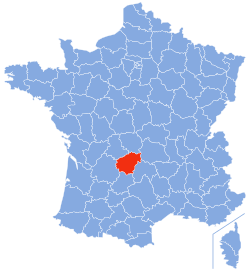Correze
| Corrèze | ||
|---|---|---|
| Department | ||

Prefecture building of the Corrèze department, in Tulle
|
||
|
||
 Location of Corrèze in France |
||
| Coordinates: 45°20′N 1°50′E / 45.333°N 1.833°ECoordinates: 45°20′N 1°50′E / 45.333°N 1.833°E | ||
| Country | France | |
| Region | Nouvelle-Aquitaine | |
| Prefecture | Tulle | |
| Subprefectures |
Brive-la-Gaillarde Ussel |
|
| Government | ||
| • President of the General Council | Gérard Bonnet (PS) | |
| Area | ||
| • Total | 5,857 km2 (2,261 sq mi) | |
| Population (2013) | ||
| • Total | 240,781 | |
| • Rank | 82nd | |
| • Density | 41/km2 (110/sq mi) | |
| Time zone | CET (UTC+1) | |
| • Summer (DST) | CEST (UTC+2) | |
| Department number | 19 | |
| Arrondissements | 3 | |
| Cantons | 19 | |
| Communes | 285 | |
| ^1 French Land Register data, which exclude estuaries, and lakes, ponds, and glaciers larger than 1 km2 | ||
Corrèze (French pronunciation: [kɔ.ʁɛz]; Occitan: Corresa) is a department in south-western France, named after the river Corrèze.
The inhabitants of the department are called Corréziens.
Corrèze is one of the original 83 departments created during the French Revolution on 4 March 1790. It includes part of the former province of Limousin (the Bas-Limousin).
The 1851 census recorded a population of 320,866: this remained relatively constant for the rest of the nineteenth century. During the twentieth century, however, Corrèze shared the experience of many of the country's rural departments as the population fell steadily.
Within Corrèze the nineteenth-century railway planners, influenced in part by the department's topography, endowed Brive-la-Gaillarde with good connections and a major junction from which railway lines fanned out in six different directions. The railways arrived in 1860, at an opportune moment, directly after phylloxera had destroyed the local wine industry. The new railways enabled the farms in the area surrounding Brive to specialise in fruits and vegetables which they could now transport rapidly to the larger population centres of central and southern France. Locally, the new agriculture triggered the development, in the Brive basin, of related businesses and industries such as the manufacture of jams and liquors, as well as timber/paper-based packaging businesses.
The department is part of the region of Nouvelle-Aquitaine. It is surrounded by the departments of Creuse, Haute-Vienne, Cantal, Puy-de-Dôme, Lot, and Dordogne. Tulle is the prefecture of Corrèze and Brive-la-Gaillarde the largest city.
...
Wikipedia

